
Ni Es lo Mismo Ni Es Igual is the eighth studio album recorded by Dominican singer-songwriter Juan Luis Guerra and his backup vocals 4–40. It was released by Karen Records on 15 December 1998 and distribuited by PolyGram Latino. It was Guerra's comeback album after four years of silence, out of the public eye and since his conversion to Christianity. It was his first studio album since Fogarate (1994). The album production and songwriting were done by Guerra. The album was supported by the release of four official singles: "Mi PC", "Palomita Blanca", "El Niagara en Bicicleta" and "La Hormiguita". Two singles were released as promotional singles: "Vale La Pena" and "Quisiera".
El día que me quieras is an Argentine tango with music by Carlos Gardel and lyrics by Alfredo Le Pera. It is considered one of the most popular songs of the 20th century and one of the best Latin songs of all time. Originally featured in the 1935 film of the same name, sung by Gardel himself, it became a heavily recorded tango standard, even by artists outside of the realm of tango. It has subsequently been covered by various artists such as Luis Miguel, Julio Iglesias, Michael Bolton Roberto Carlos, Raphael de España and Shlomo Idov who translated the song to Hebrew. The song was inducted into the Latin Grammy Hall of Fame in 2001. "El día que me quieras" was honored at the 2014 La Musa Awards as "La Canción de Todos los Tiempos". It was among the tango standards selected by Plácido Domingo for his 1981 album Plácido Domingo Sings Tangos. In addition to Domingo, the song has been covered by operatic tenors including José Carreras, Juan Diego Florez, Christian Ketter, and Alfredo Kraus.

Fogaraté! is the seventh album of the famous Dominican songwriter and musician Juan Luis Guerra. It was released on July 19, 1994. The album mixed a variety of music genres including rural and flolklroic rots of merengue called "Perico Ripao" with elements of African soukus music and Tropical Music such as Reggae with the collaboration of African guitarist Diblo Dibala and Dominican accordionist Francisco Ulloa, along with Son, Bachata and Salsa. Also, the album features a particular, bachata-styled adaptation of the Lacrimosa movement from Mozart's Requiem Mass in D Minor and Guerra's first song fully in English "July 19". Exploring lyrics and themes about magical realism of Latin American literature and commenting on the politics of the Caribbean, for many fans and critics, Fogaraté! is one of his most musically complex album.
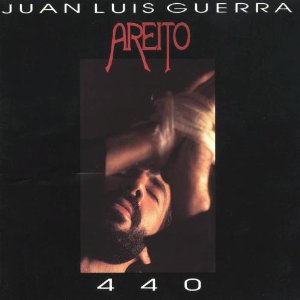
Areíto is the sixth album by Juan Luis Guerra with his band 440, released on 8 December 1992, by Karem Records. The album, meant to be a tribute to the indigenous tribes of the Dominican Republic, is named after a dance that the aboriginal inhabitants of the Greater Antilles (Taínos) accompanied with songs during their festivals and religious rites. The album contains twelve tracks including "Cuando te Beso", interpret by Santo Domingo Philharmonic Orchestra. Congolese musician Diblo Dibala played guitar on the song "El Costo de la Vida", which was a Spanish cover of his own soukous song "Kimia Eve", while the last track on the album, "Naboria daca, mayanimacaná", is sung in Arawak, the language of the Taíno people. Areíto was originally set to be released in early April 1992, but was first delayed to the end of October 1992 and was finally released on 8 December 1992.
"Hombres al Borde de un Ataque de Celos" is a dance song written by J.R. Florez, produced by Gian Pietro Felisatti and Loris Ceroni, and performed by Mexican singer Yuri. It was released in 1988 as the first single from her studio album Isla del Sol (1988), and became her second number-one single in the Billboard Hot Latin Tracks chart after "Qué Te Pasa" in 1988. Isla del Sol was the first album recorded by the singer on CBS, her record label until 1995. This song became one of her staple on every live performance and was also included on the live album Vive la Historia.
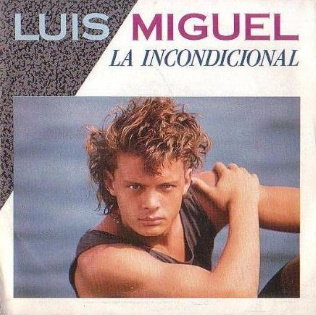
"La Incondicional" is a song written, produced, and arranged by Spanish musician Juan Carlos Calderón and performed by Mexican singer Luis Miguel. It was released in 1989 via WEA Latina as the third single from Miguel's sixth studio album, Busca una Mujer (1988). The song became his second #1 single on the Billboard Hot Latin Tracks chart after "Ahora Te Puedes Marchar" in 1987. The song broke several airplay records in Latin America, topping the charts in Mexico, Chile and Peru; and the top-ten in other countries. The success of the song helped push the album to #3 on the Billboard Latin Pop Albums with approximate sales of four million units.
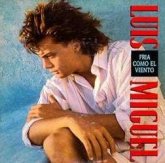
"Fría Como el Viento" is a ballad written, produced and arranged by Juan Carlos Calderón and performed by Mexican singer Luis Miguel. It was released as the first single from the Grammy-nominated studio album Busca una Mujer (1988). The song became the third number-one single for the singer in the Billboard Hot Latin Tracks chart after "Ahora Te Puedes Marchar" in 1987 and "La Incondicional", the preceding single.
"Inolvidable" ("Unforgettable") is a song written by Julio Gutiérrez in 1944. It is considered one of the most popular boleros released during the Cuban musical movement led by pianists. The song has been recorded by several performers, including Roberto Carlos, Diego El Cigala, Fania All-Stars, Eydie Gormé, Danny Rivera, Tito Rodríguez and Bebo Valdés, among others.
The Dominican singer, songwriter and producer Juan Luis Guerra has released 14 studio albums, two live albums and forty-eight singles. He is one of the best selling Latin artist of all time with more 30 millions of records worldwide. He made his debut with his first studio album Soplando, released in 1984. He later released his second studio album in 1985, Mundanza y Acarreo which was his first national success and marked his first entry at the US Billboard Charts at number seventeen on Billboard Tropical Charts. In 1987, his third studio album Mientras Más Lo Pienso...Tú become his first work to gain international attention in countries such as Venezuela and Puerto Rico. Between this last two albums, it sold over two million copies worldwide.

"Burbujas de Amor" is a song by Dominican singer-songwriter Juan Luis Guerra, released as the third single of his album Bachata Rosa (1990). It is widely considered one of Guerra's most popular songs. The song was a commercial success and became an international hit in Europe and Latin America. It peaked at number 2 on the Hot Latin Songs chart. The track received universal acclaim from critics and was praised for its sophisticated lyrics and elegance.
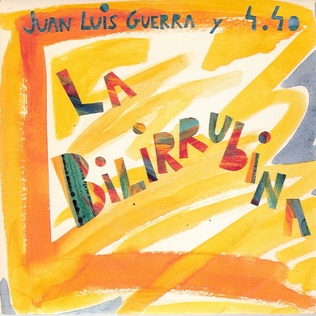
"La Bilirrubina" is a song by Dominican singer-songwriter Juan Luis Guerra. It was written by Guerra and released by Karem Records on 1990 and 1991 in Europe as the second single from his fifth studio album, Bachata Rosa. It was nominated for Record of the Year at 1991 Lo Nuestro Awards. The merengue track is considered one of Guerra's signature songs and most popular. It receive positive reviews and was listed one of the best tracks of the album.
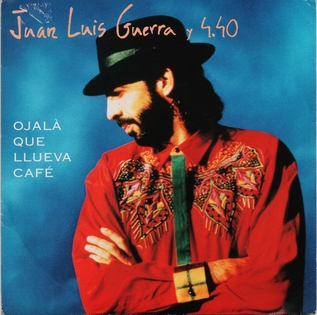
Ojala Que Llueva Cafe is the lead single by the Dominican artist Juan Luis Guerra and his band 4:40 from their fourth studio album of the same title. It was released on 1989 by Karen Records and 1990 in Europe by Ariola Records. The lyrics are a poetic metaphor about the poor conditions of the hard-working people residing in the countryside and the hope that the things are going be better someday in the future. Is one of Guerra’s signature songs and one of the first tracks to gain international attention in his career, peaking on the Billboard Hot Latin Tracks and Latin America airplay charts. The music video was ranked number one of the top 15 best music videos of all time by Dominican artists.
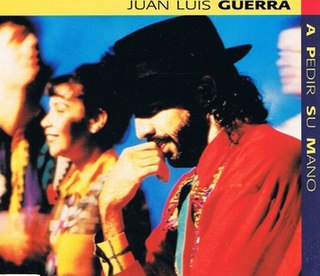
A Pedir Su Mano is a song by Dominican Republic singer-songwriter Juan Luis Guerra released as the fourth single for his album Bachata Rosa (1990). It was released in 1990 by Karem Records and in 1992 on Europe by Ariola. The track is a merengue version of the song “Dede Priscilla,” by Lea Lignazi from the Central African Republic. The track combined music elements of Afropop and zouk with merengue. The music video shows people in traditional African dress dancing in sugarcane fields with a cartoon of a red train traversing the landscape.

"Bachata Rosa" is a song by Dominican Republic singer-songwriter Juan Luis Guerra released in 1991 and served as the lead seventh and final from his fifth studio album Bachata Rosa (1990). Along with Estrellitas y Duendes and Como Abeja Al Panal, is one of Guerra's first international hits and helped to contribute to the bachata sophistication and have recognition in Latin America and Europe. The track was a commercial success, toping the airplay charts in Mexico and was the fourth single of the album to peak insade of the top 10 at the US Hot Latin Tracks.
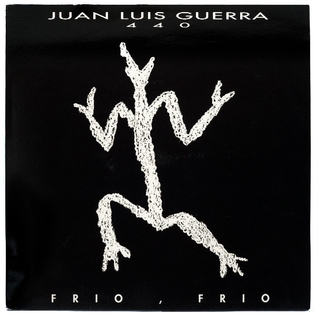
Frio Frio or Frio, Frio is the lead single of the sixth studio album Areito by Dominican superstar Juan Luis Guerra. The track is a bachata and was written based on a poem by Federico García Lorca and was released in August 1991. The track received positive reviews from critics and was nominated for Tropical Salsa Song of the Year at the 4th Lo Nuestro Awards. Frio Frio was a success peaking at number 4 on Billboard Hot Latin Tracks and at the Top 5 airplay in Panama and Uruguay.
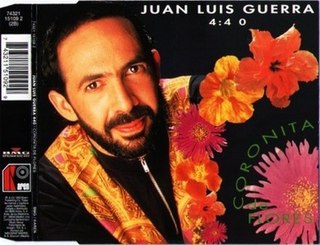
Coronita de Flores is the fifth single of Juan Luis Guerra sixth studio album Areito, released in 1993 by Karem Records. The song was written band produced by Juan Luis Guerra. The track received positive reviews due the musical structure of cha-cha and Bolero and was nominated for Tropical/Salsa Song of the Year at the 1994's Lo Nuestro Awards.
Cuando Te Beso(English: When I kiss you) is the seventh and final single of Juan Luis Guerra sixth studio album Areito, released on 1993 in Europe and in January 1994 in the United States by Karem Records. The album also contained other version of the track performed by the Santo Domingo Philharmonic Orchestra. The song peaked at number 28 on the US Hot Latin Songs and reached the top-ten in Chile and Panama. The track receive positive reviews by the critics. Ramiro Burr from Austin American Statesman stated that track is "an affecting tale of devotion". Robert Hilburn from Los Angeles Times wrote that the track had percussion "had some wonderfully affecting ballad work".
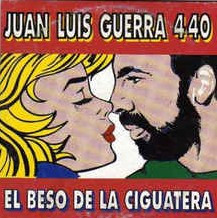
El Beso de la Ciguatera is a song by Dominican Republic singer-songwriter Juan Luis Guerra released as the third single for his album Fogarate (1994) with the collaboration of Diblo Dibala. The song was released in January 23, 1995 by Karen Records. The track encompasses merengue with soukus. The song was a recipient of a Broadcast Music, Inc. (BMI) Latin Award in 1996. Commercially, it reached the top ten on the Billboard Hot Latin Songs and Tropical Airplay charts in the United States. It also received moderate airplay in Europe.
"El Farolito" is a song recorded by Dominican singer Juan Luis Guerra for his seventh studio album, Fogaraté (1994), included as its eighth track. It was composed and produced by Guerra and the Dominican accordionist Francisco Ulloa and his band. The track is a Perico Ripiao, better known as merengue tipico, a rural version of merengue and it describes the curves of the body of a lover and his feelings for her. According Guerra, "El Farolito" is his favorite track on the album. The track was received well by the critics and according to some is "a kind of higher-class version of merengue típico".
Bachata Rosa World Tour is the first concert world tour by Dominican recording artist Juan Luis Guerra and his Band 4:40 to promote this block boster album Bachata Rosa (1990). it started at July 5, 1991 a in Puerto Rico and ended on July 4, 1992 in Los Angeles, and sponsored by soft drink soft drink manufacturer Pepsi. With tour stops throughout the Americas and Europe, it broke severial attedance records and drew over 350,000 fans.









